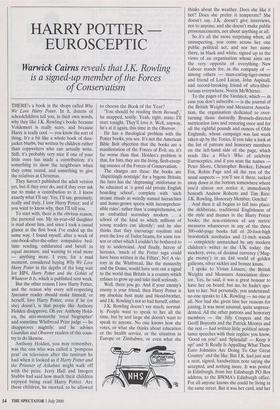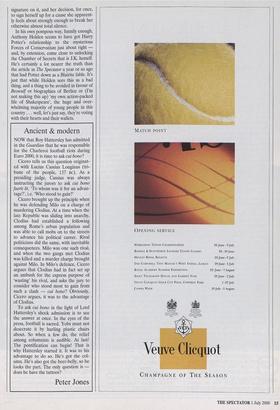HARRY POTTER EUROSCEPTIC
Warwick Cairns reveals that J.K. Rowling
is a signed-up member of the Forces of Conservatism
THERE's a book in the shops called Why We Love Harry Potter. In it, dozens of schoolchildren tell you, in their own words, why they like J.K. Rowling's books because Voldemort is really scary, and because Harry is really cool — you know the sort of thing. It's a bit like a whole book of dust- jacket blurbs, but written by children rather than copywriters who can actually write. Still, it's probably very nice if one of your little ones has made a contribution: it's something to show the neighbours when they come round, and something to give the relatives at Christmas.
They haven't published the adult version yet, but if they ever do, and if they ever ask me to make a contribution to it, I know exactly what I'll say. Yes, I'll say, genuinely, really and truly, I love Harry Potter; and if you want to know why, then I'll tell you.
To start with, there is the obvious reason, the personal one. My six-year-old daughter is mad about him, and since I took a casual glance at the first book I've ended up the same way. I found myself, after a week of one-book-after-the-other compulsive bed- time reading, exhilarated and bereft in equal measure, and wanting to read more — anything more. I even, for a mad moment, considered buying Why We Love Harry Potter in the depths of the long wait for HP4, Harry Potter and the Goblet of Whatever It Is, which is published next week.
But the other reason I love Harry Potter, and the reason why every self-respecting Spectator reader should make himself, or herself, love Harry Potter, even if he (or she) doesn't, is that people like Anthony Holden disapprove. Oh yes: Anthony Hold- en, the anti-monarchy 'royal biographer' and sometime Whitbread Prize judge — he disapproves mightily; and he advises Guardian and Observer readers of this coun- try to do likewise.
Anthony Holden, you may remember, was the one who was called a 'pompous prat' on television after the tantrum he had when it looked as if Harry Potter and the Prisoner of Azkaban might walk off with the prize. Jerry Hall and Imogen Stubbs had said how much their children enjoyed being read Harry Potter. Are these children, he snorted, to be allowed to choose the Book of the Year?
`You should be reading them Beowulf,' he snapped, testily. Yeah, right, mate: I'll start tonight. They'll love it. Well, anyway, he's at it again, this time in the Observer.
He has a theological problem with the Potter books, you see. It's not the American Bible Belt objection that the books are a manifestation of the Forces of Evil: no, it's far worse than that. Holden's problem is that, for him, they are the living, flesh-creep- ing essence of the Forces of Conservatism.
The charges are these: the books are `dispiritingly nostalgic' for a bygone Britain; the hero has the 'depressing' misfortune to be educated at `a good old private English boarding school', complete with `such arcane rituals as weirdly named hierarchies and home-grown sports with incomprehen- sible rules', rather than 'a comprehensive, or an embattled secondary modern . .. a school of the kind to which millions of young readers can identify'; and he also thinks that they encourage royalism and even the love of Tudor beams, for some rea- son or other which I couldn't be bothered to try to understand. And finally, heresy of heresies, 'much of the Potter saga could have been written in the Fifties'. No! A vic- tory in the Whitbread, like the monarchy and the Dome, would have sent out a signal to the world that Britain is a country which refuses to grow up and take itself seriously.
Well, there you go. And if your enemy's enemy is your friend, then Harry Potter is my absolute best mate and blood-brother, and J.K. Rowling's not so bad herself, either.
J.K. Rowling doesn't say much, normal- ly. People want to speak to her all the time, but by and large she doesn't want to speak to anyone. No one knows how she votes, or what she thinks about education or the health service, or the situation in Europe or Zimbabwe, or even what she thinks about the weather. Does she like it hot? Does she prefer it temperate? She doesn't say. J.K. doesn't give interviews, not to anyone; and she doesn't make public pronouncements, not about anything at all.
So it's all the more surprising when, all unsuspecting, you come across her one public political act, and see her name there, in black and white, signed up to the views of an organisation whose aims are the very opposite of everything New Labour stands for, in the company of among others — man-eating-tiger-owner and friend of Lord Lucan, John Aspinall, and record-breaking friend of ultra-liber- tarians everywhere, Norris McWhirter.
To the pages of the Yardstick, which — in case you don't subscribe — is the journal of the British Weights and Measures Associa- tion, the organisation dedicated to over- turning those dastardly Brussels-directed metrication laws and restoring once and for all the rightful pounds and ounces of Olde Englande, whose campaign was last week taken up by the Tories. If you take a look at the list of patrons and honorary members on the left-hand side of the page, which reads like a Who's Who of celebrity Eurosceptics, and if you scan the names Peter Shore, Christopher Booker, Edward Fox, Robin Page and all the rest of the usual suspects — you'll see it there, tucked away down at the bottom somewhere where you'd almost not notice it, immediately beneath Andrew Roberts and Tim Rice: J.K. Rowling. Honorary Member. Gotcha!
And then it all begins to fall into place: the deliberate, traditional Englishness of the style and themes in the Harry Potter books; the non-existence of any metric measures whatsoever in any of the three 300-odd-page books full of 20-foot-high broomstick acrobatics and 11-inch wands — completely unmatched by any modern children's writer in the UK today; the mockery, even, of decimal currency (`Mug- gle money') in an £sd world of golden galleons, silver sickles and bronze knuts.
I spoke to Vivian Linacre, the British Weights and Measures Association direc- tor. Yes, he said, it was a great honour to have her on board; but no, he hadn't spo- ken to her. Not personally, you understand: no one speaks to J.K. Rowling — no one at all. Nor had she given him her reasons for joining. It was most unusual, quite unprece- dented. All the other patrons and honorary members — the Jilly Coopers and the Geoff Boycotts and the Patrick Moores and the rest — had written little political accep- tance speeches with their replies: you know, `Good on you!' and 'Splendid! — Keep it up!' and 'It Really Is Appalling What These Euro Johnnies Are Doing To Our Great Country' and the like. But J.K. had just sent a neat, signed, handwritten note saying she accepted, and nothing more. It was posted in Edinburgh, from her Edinburgh PO Box address, to the BWMA's Edinburgh office. For all anyone knows she could be living in the same street. But it was her card, and her signature on it, and her decision, for once, to sign herself up for a cause she apparent- ly feels about strongly enough to break her otherwise almost total silence.
In his own pompous way, funnily enough, Anthony Holden seems to have got Harry Potter's relationship to the mysterious Forces of Conservatism just about right and, by extension, come close to unlocking the Chamber of Secrets that is J.K. herself. He's certainly a lot nearer the truth than the article in The Spectator a year or so ago that had Potter down as a Blairite fable. It's just that while Holden sees this as a bad thing, and a thing to be avoided in favour of Beowulf or biographies of Berlioz or (I'm not making this up) 'my own action-packed life of Shakespeare', the huge and over- whelming majority of young people in this country . . . well, let's just say, they're voting with their hearts and their wallets.



























































 Previous page
Previous page